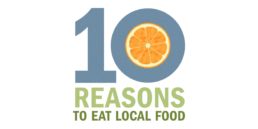I was all set to write about these crazy last few days, but I just don’t have the energy. So, I give you an article that I ran across a few days ago; which is strange because by happenstance, earlier this week, I found myself in Downtown Fullerton at the local Farmers’ Market. It is vastly superior to the sad attempt Brea puts on; so, I’m definitely going back next week. And being on a little bit of a health kick these last few months, with renewed interest in working out and attempting to eat better, I can’t wait to pick up some fresh produce. Not to mention, I have an interesting bet with some friends down there that is going to make Thursday night very interesting and it might even get me painting again…
10 Reasons to Eat Local Food
Eating local means more for the local economy. According to a study by the New Economics Foundation in London, a dollar spent locally generates twice as much income for the local economy. When businesses are not owned locally, money leaves the community at every transaction. (reference)
Locally grown produce is fresher. While produce that is purchased in the supermarket or a big-box store has been in transit or cold-stored for days or weeks, produce that you purchase at your local farmer’s market has often been picked within 24 hours of your purchase. This freshness not only affects the taste of your food but the nutritional value which declines with time.
Local food just plain tastes better. Ever tried a tomato that was picked within 24 hours? ‘Nuff said.
Locally grown fruits and vegetables have longer to ripen. Because the produce will be handled less, locally grown fruit does not have to be “rugged” or stand up to the rigors of shipping. This means that you are going to be getting peaches so ripe that they fall apart as you eat them, figs that would have been smashed to bits if they were sold using traditional methods, and melons that were allowed to ripen until the last possible minute on the vine.
Eating local is better for air quality and pollution than eating organic. In a March 2005 study by the journal Food Policy, it was found that the miles that organic food often travels to our plate create environmental damage that outweighs the benefit of buying organic. (reference)
Buying local food keeps us in touch with the seasons. By eating with the seasons, we are eating foods when they are at their peak taste, are the most abundant, and the least expensive.
Buying locally grown food is fodder for a wonderful story. Whether it’s the farmer who brings local apples to market or the baker who makes local bread, knowing part of the story about your food is such a powerful part of enjoying a meal.
Eating local protects us from bio-terrorism. Food with less distance to travel from farm to plate has less susceptibility to harmful contamination. (reference)
Local food translates to more variety. When a farmer is producing food that will not travel a long distance, will have a shorter shelf life, and does not have a high-yield demand, the farmer is free to try small crops of various fruits and vegetables that would probably never make it to a large supermarket. Supermarkets are interested in selling “Name brand” fruit: Romaine Lettuce, Red Delicious Apples, Russet Potatoes. Local producers often play with their crops from year to year, trying out Little Gem Lettuce, Senshu Apples, and Chieftain Potatoes.
Supporting local providers supports responsible land development. When you buy local, you give those with local open space – farms and pastures – an economic reason to stay open and undeveloped.
Current mood: hungry
1 Comment
Comments are closed.

I am so jealous. I miss the farmers market! When I was little, my Korean grandmother would take me to the oriental farmers market in Atlanta. The fruit! The specialties! The wild array of seafood!
You have inspired me to find a local market, even though there is no oriental market nearby, the regular one will satisfy my cravings well enough.